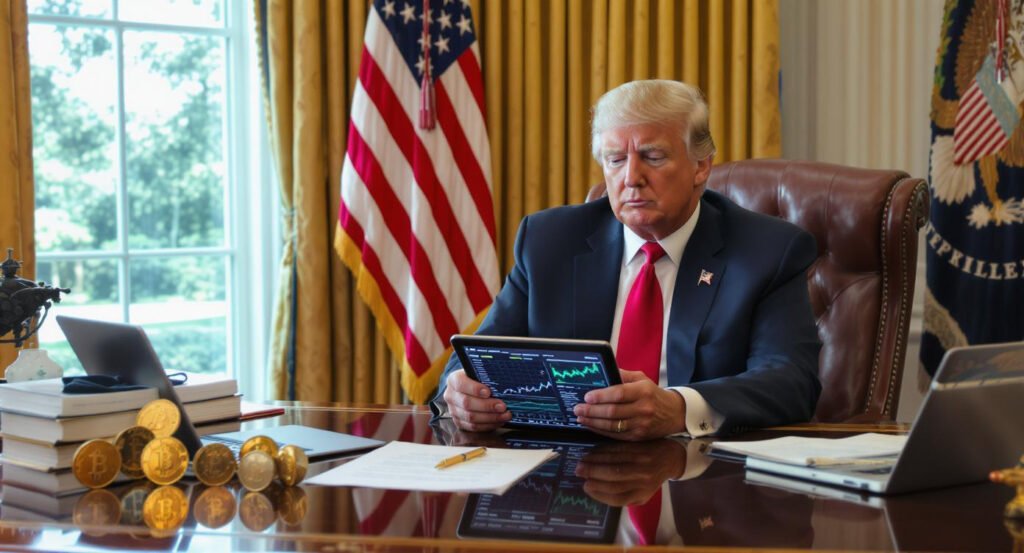Donald Trump’s Growing Crypto Empire
Donald Trump has become a vocal supporter of Bitcoin since returning to the White House, aiming to make America a global crypto hub. His administration has actively pursued policies to achieve this, including appointing pro-crypto regulators, planning a strategic Bitcoin reserve, pardoning Ross Ulbricht, and signing the landmark GENIUS Act.
A recent 166-page roadmap further details U.S. leadership in digital asset adoption. While these policies are presented as beneficial for the nation, they also align with the president’s personal business interests, despite official White House denials of any conflict. This unique intersection of political power and the rapidly expanding cryptocurrency market is a key area of focus.
Policies Aligning with Personal Financial Interests
The Trump administration’s pro-crypto policies, from regulatory appointments to legislative acts like the GENIUS Act, create a favorable environment for digital assets. This climate, while broadly beneficial for the industry, also directly supports the president’s personal financial ventures in crypto. The administration’s roadmap for digital asset adoption further solidifies this alignment. Critics highlight this convergence of public policy and private gain as a potential conflict of interest, despite the White House’s repeated insistence otherwise. This dynamic underscores a unique intersection of political power and the rapidly expanding cryptocurrency market, raising questions about ethical boundaries.
A Multi-Faceted Crypto Portfolio
An examination of Donald Trump’s involvement in the cryptocurrency industry reveals a substantial and diverse portfolio. Data indicates he holds $430 million across various crypto wallets. His stake in World Liberty Financial is valued at $390 million.
Additionally, he has generated an estimated $315 million in revenues from the $TRUMP meme coin, notably boosting its price by hosting a special dinner for its largest holders. His direct crypto income also includes $6.6 million from his non-fungible token (NFT) collection, featuring digital art depicting him in various roles. This multi-faceted engagement highlights the depth of his personal financial ties to the digital asset space, showcasing a broad and active involvement.
TMTG’s Bitcoin Treasury: A Corporate Play
Beyond his direct crypto holdings, the Trump Media & Technology Group (TMTG), parent company of Truth Social, is a significant enterprise where the president is a majority stakeholder. TMTG has adopted a strategy similar to MicroStrategy, a pioneer in corporate Bitcoin accumulation. TMTG currently holds approximately 18,430 BTC, valued at about $2.1 billion.
This move into Bitcoin as a treasury asset aims to ensure the company’s financial freedom, protect against discrimination by financial institutions, and create synergies with a planned utility token for the Truth Social ecosystem, as stated by CEO Devin Nunes. This strategic decision reflects a growing trend among public companies to integrate Bitcoin into their balance sheets for long-term financial stability.
Stock Performance Lags Bitcoin’s Gains
Despite TMTG’s substantial Bitcoin holdings, the company’s stock performance has consistently underperformed against Bitcoin itself. While the world’s largest cryptocurrency experienced a 5% decline in the past week, TMTG shares plunged by 11% during the same period. Over a monthly timeframe, Bitcoin was up 2.3%, while Trump’s stock was down 2.5%.
The disparity is even more stark over six months: Bitcoin saw a 10.6% increase, whereas TMTG shares tanked by a significant 47%. This underperformance suggests that TMTG’s stock price is influenced by factors beyond just its Bitcoin treasury, such as broader market sentiment towards the company or its operational performance, highlighting a complex interplay of market forces.
The Strategy Playbook: Indirect Exposure
The adoption of a Bitcoin treasury strategy by companies like TMTG, popularized by Michael Saylor, offers everyday investors and institutions indirect exposure to the digital asset without direct ownership. In theory, a surge in Bitcoin’s value should correlate with a rise in the company’s share price. However, as seen with TMTG, this correlation is not always direct or immediate. The company’s decision to hold Bitcoin as a reserve asset aims to provide financial freedom and protection against traditional financial discrimination, while also planning for future utility tokens within its ecosystem. This approach highlights a new model for corporate finance where digital assets play a central role in treasury management, offering a novel investment avenue.
Crypto Industry’s Influence on Political Funding
The cryptocurrency industry has emerged as a significant contributor to MAGA Inc., a political action committee (PAC) that supports Donald Trump. Prominent figures and entities from the crypto space, including Crypto.com, Blockchain.com, and the Winklevoss twins, are among the deep-pocketed donors to this PAC. This financial support underscores the growing influence of the crypto industry in the political landscape, particularly in backing candidates who advocate for favorable regulatory environments and policies.
The contributions highlight a strategic effort by the crypto sector to engage with political processes and shape future legislation that could impact the industry’s growth and adoption, demonstrating a clear link between financial support and policy advocacy.
A New Intersection of Politics and Digital Assets
Donald Trump’s extensive involvement in the cryptocurrency space, encompassing personal holdings, meme coin ventures, and corporate treasury strategies, marks a unique intersection of politics and digital assets. His administration’s pro-crypto policies, while presented as beneficial for the nation, also align with his personal financial interests.
Despite TMTG’s substantial Bitcoin treasury, its stock performance has lagged behind Bitcoin’s gains, indicating other market factors at play. The significant financial contributions from the crypto industry to his political action committee further highlight the sector’s growing influence. This evolving landscape underscores a new era where political figures and their financial empires are increasingly intertwined with the dynamic world of cryptocurrency, raising questions about transparency and influence.
Read more: Navigating Bitcoin’s Historic Rise and What’s Next























